Two human rights groups on Tuesday accused Yemen's Huthi rebels of arbitrarily arresting dozens of people for celebrating the anniversary of a 1962 coup in the country's north and called for their release.

> New York-headquartered Human Rights Watch and the Cairo Institute for Human Rights (CIHR) said that at the end of September there was a "wave" of arrests of people "peacefully celebrating or posting on social media" about the anniversary marking the creation of the Yemen Arab Republic.
> The groups said the Iran-backed Huthis, who control vast swathes of Yemen including its capital Sanaa, had brought no charges against the protesters and "should immediately release all those who were detained solely for exercising their right to freedom of assembly and speech".
> The Huthis have kidnapped, arbitrarily detained and tortured hundreds of civilians, including UN and NGO workers, since the start of Yemen's civil war in 2014, according to rights groups.
People who have fled Afghanistan encourage the world to sever ties with the Taliban. That only harms those of us still here, says an anonymous female aid worker
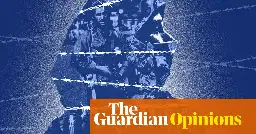
The UN Global Compact areas of greatest concern, including human rights and gender, support for the OHCHR, & inclusive approaches to internet governance.

> First, and foremost, references to States’ obligations under international human rights law are not sufficiently robust nor consistently mainstreamed throughout the text. We call on Member States to ground all objectives set out in the document in international human rights law. This includes adding references to “international human rights law” while also maintaining the role of international human rights law as a body of international law. For example, we are concerned that paragraph 30(d) refers to “international law” and fails to recognize the need for States to refrain from the use of mass surveillance and ensure that targeted surveillance technologies are only used in compliance with international human rights law, including the principles of legality, legitimacy, necessity, and proportionality. This paragraph should also acknowledge the need for States to promote privacy-preserving and rights-respecting technologies, including end-to-end encryption, pseudonymity, and anonymity, which secure and protect the confidentiality and security of digital communications, in accordance with various UN resolutions (including the UN Human Rights Council resolution on the Right to privacy in the digital age A/HRC/RES/54/21 and the new General Assembly resolution on the Promotion and protection of human rights in the context of digital technologies A/RES/78/213). We further call on Member States to add references to “international humanitarian law” and “international refugee law” where relevant for the same reasons.
For further disambiguation: https://www.amnesty.org/en/latest/campaigns/2022/02/israels-system-of-apartheid/
Let me know once you've read the Einstein-Freud Correspondence and re-assessed your opinions to be non-machiavellian. Then I will be happy to continue to engage with you.
The International Court of Justice (ICJ) issued an advisory opinion on July 19, 2024, with significant consequences for human rights protections in Palestine under Israel’s 57-year occupation. The opinion stems from a December 2022 request by the United Nations General Assembly to the court to consi...

cross-posted from: https://lemmy.sdf.org/post/19768980
> archive.org link > > > In a historic ruling the International Court of Justice has found multiple and serious international law violations by Israel towards Palestinians in the Occupied Palestinian Territory, including, for the first time, finding Israel responsible for apartheid. The court has placed responsibility with all states and the United Nations to end these violations of international law. The ruling should be yet another wake up call for the United States to end its egregious policy of defending Israel’s oppression of Palestinians and prompt a thorough reassessment in other countries as well.
cross-posted from: https://lemmy.sdf.org/post/19769250
> Summary provided by https://notegpt.io/pdf-summary > > Summary > > The International Court of Justice has found that Israel’s policies and practices in the Occupied Palestinian Territory, including East Jerusalem, violate international law. The Court determined that Israel’s actions, such as its settlement policy, acts of annexation, and discriminatory legislation and measures, constitute a breach of international law, including the prohibition on the use of force and the non-acquisition of territory by force. Israel’s presence in the territory is deemed unlawful, and the Court has called for an end to settlement activities, evacuation of settlers, reparations for damages caused, and non-recognition of the illegal situation by states and international organizations. > > Key Insights > > * The International Court of Justice has determined that Israel’s presence in the Occupied Palestinian Territory, including East Jerusalem, violates international law. > * Israel’s settlement policy, acts of annexation, discriminatory legislation, and measures were found to be in breach of international law. > * The Court has called for an end to settlement activities, evacuation of settlers, reparations for damages, and non-recognition of the illegal situation. > * The General Assembly and Security Council of the United Nations are tasked with considering further action to end Israel’s presence in the territory. > * The Court emphasizes the importance of achieving a just and lasting peace in the region for the benefit of all parties involved. > > Frequently Asked Questions > > Question > > What actions were deemed unlawful by the International Court of Justice in the Occupied Palestinian Territory? > > Answer > > The Court found Israel’s settlement policy, acts of annexation, discriminatory legislation, and measures to be in violation of international law. > > Question > > What measures did the Court call for to address Israel’s presence in the territory? > > Answer > > The Court called for an end to settlement activities, evacuation of settlers, reparations for damages caused, and non-recognition of the illegal situation. > > Question > > Which international organizations are obligated not to recognize the illegal situation in the Occupied Palestinian Territory? > Answer > All states and international organizations are obligated not to recognize the illegal situation in the territory. > > Question > > What role do the General Assembly and Security Council of the United Nations play in addressing Israel’s presence in the territory? > > Answer > > The General Assembly and Security Council are tasked with considering further action to end Israel’s presence in the Occupied Palestinian Territory.
The International Court of Justice (ICJ) issued an advisory opinion on July 19, 2024, with significant consequences for human rights protections in Palestine under Israel’s 57-year occupation. The opinion stems from a December 2022 request by the United Nations General Assembly to the court to consi...

cross-posted from: https://lemmy.sdf.org/post/19768980
> archive.org link > > > In a historic ruling the International Court of Justice has found multiple and serious international law violations by Israel towards Palestinians in the Occupied Palestinian Territory, including, for the first time, finding Israel responsible for apartheid. The court has placed responsibility with all states and the United Nations to end these violations of international law. The ruling should be yet another wake up call for the United States to end its egregious policy of defending Israel’s oppression of Palestinians and prompt a thorough reassessment in other countries as well.
Summary provided by https://notegpt.io/pdf-summary
Summary The International Court of Justice has found that Israel’s policies and practices in the Occupied Palestinian Territory, including East Jerusalem, violate international law. The Court determined that Israel’s actions, such as its settlement policy, acts of annexation, and discriminatory legislation and measures, constitute a breach of international law, including the prohibition on the use of force and the non-acquisition of territory by force. Israel’s presence in the territory is deemed unlawful, and the Court has called for an end to settlement activities, evacuation of settlers, reparations for damages caused, and non-recognition of the illegal situation by states and international organizations.
Key Insights The International Court of Justice has determined that Israel’s presence in the Occupied Palestinian Territory, including East Jerusalem, violates international law. Israel’s settlement policy, acts of annexation, discriminatory legislation, and measures were found to be in breach of international law. The Court has called for an end to settlement activities, evacuation of settlers, reparations for damages, and non-recognition of the illegal situation. The General Assembly and Security Council of the United Nations are tasked with considering further action to end Israel’s presence in the territory. The Court emphasizes the importance of achieving a just and lasting peace in the region for the benefit of all parties involved. Frequently Asked Questions Question
What actions were deemed unlawful by the International Court of Justice in the Occupied Palestinian Territory? Answer The Court found Israel’s settlement policy, acts of annexation, discriminatory legislation, and measures to be in violation of international law.
Question
What measures did the Court call for to address Israel’s presence in the territory? Answer The Court called for an end to settlement activities, evacuation of settlers, reparations for damages caused, and non-recognition of the illegal situation.
Question
Which international organizations are obligated not to recognize the illegal situation in the Occupied Palestinian Territory? Answer All states and international organizations are obligated not to recognize the illegal situation in the territory.
Question
What role do the General Assembly and Security Council of the United Nations play in addressing Israel’s presence in the territory? Answer The General Assembly and Security Council are tasked with considering further action to end Israel’s presence in the Occupied Palestinian Territory.
Summary provided by https://notegpt.io/pdf-summary
Summary The International Court of Justice has found that Israel’s policies and practices in the Occupied Palestinian Territory, including East Jerusalem, violate international law. The Court determined that Israel’s actions, such as its settlement policy, acts of annexation, and discriminatory legislation and measures, constitute a breach of international law, including the prohibition on the use of force and the non-acquisition of territory by force. Israel’s presence in the territory is deemed unlawful, and the Court has called for an end to settlement activities, evacuation of settlers, reparations for damages caused, and non-recognition of the illegal situation by states and international organizations.
Key Insights The International Court of Justice has determined that Israel’s presence in the Occupied Palestinian Territory, including East Jerusalem, violates international law. Israel’s settlement policy, acts of annexation, discriminatory legislation, and measures were found to be in breach of international law. The Court has called for an end to settlement activities, evacuation of settlers, reparations for damages, and non-recognition of the illegal situation. The General Assembly and Security Council of the United Nations are tasked with considering further action to end Israel’s presence in the territory. The Court emphasizes the importance of achieving a just and lasting peace in the region for the benefit of all parties involved. Frequently Asked Questions Question
What actions were deemed unlawful by the International Court of Justice in the Occupied Palestinian Territory? Answer The Court found Israel’s settlement policy, acts of annexation, discriminatory legislation, and measures to be in violation of international law.
Question
What measures did the Court call for to address Israel’s presence in the territory? Answer The Court called for an end to settlement activities, evacuation of settlers, reparations for damages caused, and non-recognition of the illegal situation.
Question
Which international organizations are obligated not to recognize the illegal situation in the Occupied Palestinian Territory? Answer All states and international organizations are obligated not to recognize the illegal situation in the territory.
Question
What role do the General Assembly and Security Council of the United Nations play in addressing Israel’s presence in the territory? Answer The General Assembly and Security Council are tasked with considering further action to end Israel’s presence in the Occupied Palestinian Territory.
Agreed. Let me see what I can do.
Summary provided by https://notegpt.io/pdf-summary
Summary
The International Court of Justice has found that Israel’s policies and practices in the Occupied Palestinian Territory, including East Jerusalem, violate international law. The Court determined that Israel’s actions, such as its settlement policy, acts of annexation, and discriminatory legislation and measures, constitute a breach of international law, including the prohibition on the use of force and the non-acquisition of territory by force. Israel’s presence in the territory is deemed unlawful, and the Court has called for an end to settlement activities, evacuation of settlers, reparations for damages caused, and non-recognition of the illegal situation by states and international organizations.
Key Insights
- The International Court of Justice has determined that Israel’s presence in the Occupied Palestinian Territory, including East Jerusalem, violates international law.
- Israel’s settlement policy, acts of annexation, discriminatory legislation, and measures were found to be in breach of international law.
- The Court has called for an end to settlement activities, evacuation of settlers, reparations for damages, and non-recognition of the illegal situation.
- The General Assembly and Security Council of the United Nations are tasked with considering further action to end Israel’s presence in the territory.
- The Court emphasizes the importance of achieving a just and lasting peace in the region for the benefit of all parties involved.
Frequently Asked Questions
Question
What actions were deemed unlawful by the International Court of Justice in the Occupied Palestinian Territory?
Answer
The Court found Israel’s settlement policy, acts of annexation, discriminatory legislation, and measures to be in violation of international law.
Question
What measures did the Court call for to address Israel’s presence in the territory?
Answer
The Court called for an end to settlement activities, evacuation of settlers, reparations for damages caused, and non-recognition of the illegal situation.
Question
Which international organizations are obligated not to recognize the illegal situation in the Occupied Palestinian Territory? Answer All states and international organizations are obligated not to recognize the illegal situation in the territory.
Question
What role do the General Assembly and Security Council of the United Nations play in addressing Israel’s presence in the territory?
Answer
The General Assembly and Security Council are tasked with considering further action to end Israel’s presence in the Occupied Palestinian Territory.
The International Court of Justice (ICJ) issued an advisory opinion on July 19, 2024, with significant consequences for human rights protections in Palestine under Israel’s 57-year occupation. The opinion stems from a December 2022 request by the United Nations General Assembly to the court to consi...

> In a historic ruling the International Court of Justice has found multiple and serious international law violations by Israel towards Palestinians in the Occupied Palestinian Territory, including, for the first time, finding Israel responsible for apartheid. The court has placed responsibility with all states and the United Nations to end these violations of international law. The ruling should be yet another wake up call for the United States to end its egregious policy of defending Israel’s oppression of Palestinians and prompt a thorough reassessment in other countries as well.
> The Finance Bill, 2024 was tabled in parliament on 9 May 2024 and faced strong opposition from members of the public and other stakeholders during the public participation stage. This was due to the threats that it posed to data protection, the business environment, and a choking cost of living crisis that would be worsened by increased taxes. While President Ruto announced the withdrawal of the contentious bill on 26 June 2024, the actions of state authorities prior to and after this decision have created a very chilling environment for citizens, human rights defenders, journalists, and political dissidents opposed to the bill and critical of the government’s actions.
Hamas’ military wing – the Qassam Brigades – and at least four other Palestinian armed groups committed numerous war crimes and crimes against humanity against civilians during the October 7, 2023 assault on southern Israel. Governments with influence over the armed groups should press for the relea...

> Hamas’ military wing – the Qassam Brigades – and at least four other Palestinian armed groups committed numerous war crimes and crimes against humanity against civilians during the October 7, 2023 assault on southern Israel, Human Rights Watch said in a report released today. Governments with influence over the armed groups should press for the urgent release of civilian hostages, an ongoing war crime, and for those responsible to be brought to justice.
> The 236-page report, “‘I Can’t Erase All the Blood from My Mind’: Palestinian Armed Groups’ October 7 Assault on Israel,” documents several dozen cases of serious violations of international humanitarian law by Palestinian armed groups at nearly all the civilian attack sites on October 7. These include the war crimes and crimes against humanity of murder, hostage-taking, and other grave offenses. Human Rights Watch also examined the role of various armed groups and their coordination before and during the attacks. Previous Human Rights Watch reports have addressed numerous serious violations by Israeli forces in Gaza since October 7.
12 July 2024 In a judgement published yesterday, the European Court of Human Rights found that Russia violated the right to private and family life of a trans man and his two foster children by…

If you want to join this letter, fill out this form! Acesse a versão em português aqui!Versión en español aquí! In Brazil, a human rights-based approach to regulation for Artificial Intelligence Systems is urgent. It is undeniable that artificial intelligence (AI) systems have the potential to benef...
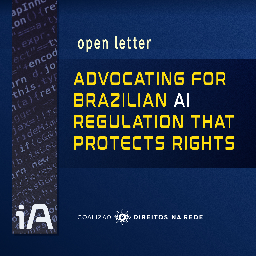
> AI is already facilitating and generating harms and violations, for instance, by reinforcing discriminatory practices, excluding marginalized groups from access to essential goods and services, supporting misinformation, undermining democratic processes, surveillance change climate, the epidemic of Indigenous and local languages and cultures, and up job insecurity.
> To ensure AI systems promote innovation based on human rights, ethics, and responsibility, it is crucial to establish minimum rules to safeguard the rights of affected individuals, obligations for AI agents, governance measures, and the definition of a regulatory framework for oversight and transparency. This is not prevents development and innovation; on the contrary, effective regulation that rights is an indispensable condition for the flourishing of the world's of the world.
The Council of Europe Commissioner for Human Rights - Human rights comments - Blog

> Council of Europe member states should adopt a human rights based approach to sex work. Such an approach must ensure sex workers’ protection from violence and abuse, their equal access to health and other social rights, as well as their rights to private life and to participate in public and political life.
> ...
> A human rights based approach also means that consensual sexual relations between adults for remuneration should not be criminalised. Criminalisation and the enforcement of punitive provisions against sex workers, clients or third parties has significantly reduced sex workers’ access to rights and essential services and has led sex workers to live and work in a clandestine manner and in isolation, in fear of the justice system. Conversely, decriminalisation of consensual adult sex work has had positive effects on the safety of sex workers and on their access to social protection and health services, resulting in improved health outcomes. The UN working Group also noted that a decriminalised framework is most conducive to the protection of sex workers’ rights to participate in public and political life.
Our supporters have taken action, proving that people power changes lives.

Iran's former president Mahmoud Ahmadinejad condemned terrorism on Sunday in an apparent reaction to the recent assassination attempt on former US president Donald Trump.

> Without naming Trump, Ahmadinejad took to X to denounce terrorism as a violation of human rights.
> "Terror and terrorism, whether state-sponsored or non-state, are among the most heinous anti-human actions that words cannot express the depth of their evil," in an apparent reference to the attack."Humanity around the world suffers from such severe pains," he said on X.
> The statement is part of his efforts in recent years to rebrand himself as a moderate figure in Iranian politics, although many still remember his hardline policies during his tenure, which included the arrest, torture, and killing of numerous protesters.
July 18 – On the eve of a scheduled extraordinary FIFA council meeting to decide the fate of Israel’s immediate future in international football, human rights and pressure groups have called on the world governing body to suspend the country from the international game. At the FIFA Congress in Bang...

> Both the PFA and IFA have filed their submissions to the panel, but human rights groups are stepping up the pressure on FIFA to take action on Israel.
> Earlier this week, FairSquare submitted a report to FIFA arguing that it has “multiple grounds to suspend or expel the IFA”, highlighting among others “the holding of matches in occupied Palestinian territory, serious and systematic racial discrimination, political interference, and Israel’s killing of Palestinian players and the systematic destruction of PFA facilities – most of which predate Israel’s attacks in Gaza since the Hamas attacks of 7 October 2023.”
> The terror attacks by Hamas killed 1,200 people on October 7 and Hamas took more than 250 hostages according to Israeli figures, but Israel has killed more than 38,000 Palestinians since, according to Palestinian health authorities.
> FairSquare argued that FIFA have to act under article 72.1, article 4.1, article 14.1 (i) and article 15 (c), and article 2.1 of the FIFA Statutes.
Government accountability whether to the parliament, the courts, or to citizens, has been substantially weakened in the past two decades.
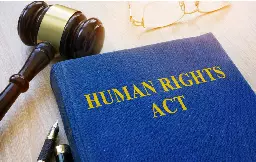
> It is often said by those who oppose a Human Rights Act that there is no need for one. The human rights of Australians are more than adequately protected by the common law and statute. Anyone still holding that view will be hard pressed to retain it should they read the recent, comprehensive report on the subject prepared by the Australian Law Reform Commission. The report is entitled ‘Traditional Rights and Freedoms: Encroachments by Commonwealth Law.
> The report identifies hundreds of provisions in Commonwealth law that may constitute incursions on human rights and freedoms. The nature and extent of the legislative provisions that may be in breach of fundamental rights and freedoms will come as a shock to anyone who cares to delve into the ALRC’s first class report. No report in recent decades has come close to providing such a detailed enumeration, description and analysis of statutory infringements of human rights. Take freedom of speech and procedural fairness as examples.
They’re just categorically different, there isn’t an “inside” or an “outside” in the sense of spatial structure as that is something derived a posteriori as part of thought.
So.. there are things that are either within the category of thought or not? Is thought mutually exclusive to material? Is thought composed of material or the other way around? Or are they both the same?
I’m not sure what it would even mean to say reality is “thought”.
That is the standard definition of idealism, is it not? That existence is immaterial?
But what justification is there that what is thought of is actually in existence outside of thought? One can think of things that do not exist outside of thought.
What justification is there that reality isn't thought by it's very nature?
How do you justify the premise that reality is objectively-existent?
In your belief.
I encourage you to read the letters between Einstein and Freud which lay the theoretical groundwork for human rights.
[1931-1932] [resource] The Einstein-Freud Correspondence
edit: still short on time, but i will re-read your post and reply to the legitimate, non-political questions.
laws are tools. binding treaties create laws.
Hello all of you subscribers! Your appreciative moderator, here, with a quick message.
This community was formed approx. a month ago. I didn't expect there to be much activity, but I was hopeful that some solid groundwork it might take off, as the time is right for human rights.
There are now 76 of us subscribed. People other than myself have started posting, which is great to see. We've started to see some comments coming in, which is also great to see.
I spent a couple of weeks laying some groundwork posts and then slowed down a little the last couple of weeks, but I think it will be sustainable for me to keep a steady, slow trickle of posts going.
This is my first time moderating an online community, so please bear with me as I learn how to keep a community happy and engaged!
Thank you for taking the time to read this and to care about human rights.
Human rights aren’t a tool at all
This is where you are wrong. They are more than just a set of ideals. They are also a set of binding international treaties.
I am short on time right now, but if this is a perennial issue for you, then I will reply in more detail soon.
The status quo use the NGO industrial complex to cynically wield human rights rhetoric
No disagreement there, other than you should be careful not tot throw out the baby with the bathwater.
In reality, Human Rights are our best tool in the fight against war. Human Rights do not make sense as a concept without understanding that. Equal rights for all means no more fighting for rights. The economic, social, and cultural rights outlined in the UNUDHR are quite obviously not the status quo.
. Instead we see “human rights” - based on what?
-==- Must Read -==-
UN Human Rights Council session was mainly focused on China's treatment of Uyghurs
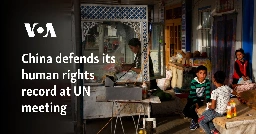
> Chen Xu, China's ambassador to the U.N. in Geneva, said at the meeting, attended by a delegation of Chinese diplomats and officials, that recommendations rejected by China were "politically motivated based on disinformation, ideologically biased or interfering in China's traditional sovereignty." He condemned what he called an attempt to "smear and attack" China.
> China has drawn much criticism over the years for its treatment and detention of Uyghurs and other Muslims. A 2022 U.N. report, published by former U.N. rights chief Michelle Bachelet, said China's treatment of Uyghurs could constitute crimes against humanity, something China has consistently denied.
> Thursday's review of China's human rights record before the Human Rights Council was the first since the publication of the 2022 report. ... Each U.N. member state undergoes a review of its human rights record every few years.
Economic growth allows the few to grow ever-wealthier. Ending poverty and environmental catastrophe demands fresh thinking
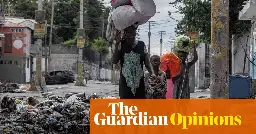
> A “human rights economy” can deliver for people and the planet because it shifts our focus from growth to humanity – grounding the purpose of the economy in fundamental, universal human values. It offers human rights as a guardrail to keep the economy on track – meeting the challenges of the climate crisis, addressing inequalities and eradicating poverty.
> This proposition is not some fairytale. Concrete steps can be taken now, starting with choosing measures of progress other than gross domestic product (GDP) – which tells us nothing about the ecological or social fallout of economic activity.
> And we need to start valuing what really counts. GDP has no way of accounting for the estimated 16.4bn hours spent every day worldwide on unpaid work, largely carried out by women, that underpins the global economy: caring for children, people with disabilities and older citizens.
Language like that plus the failure to treat the subject of discussion to dignity was almost enough for me to remove this comment, on it's own. Thankfully, the community has spoken using the tools available to them to indicate that your behavior is unacceptable. Keep it up and you'll be removed.
also, apologies to everyone at lemmy.sdf.org if i am flooding local for you. i've been busy adding a bunch links
they also have an email address: membership at sdf dot org, but yeah, the internal BBS is where it is at.
We are a public access UNIX system, so it's not as much of a void as it might seem :D
Well, please do share what you find!
You are on the right track w/ idealism vs materialism in psychology, at least.
The question there arose from the brain: how do you rectify the mind/soul with the brain/body? Dualism apparently fails (the idea that there is a separate mind from the brain) which leaves only some form of monism. A sort of hybrid materialism-idealism seems to make the most sense, where consciousness is a property of the universe, like time or space, and different entities have differing consciousnesses. In that sort of a philosophy, when talking about the brain of a person you are equally talking about the experience that person is having, just in different terms.
I suspect that in sociology that would be some sort of unified anarcho-marxism, if such a thing exists. The atomic theory of society seems to be the thing where they are working on unifying language. If society is fully atomized, asking whether a new society arises due to free choice or resource demands is like asking whether rivers rise due to rain or sewer overflow, if that makes sense?
this was one of my favorite childhood games, thanks for posting this!
apparently, depending on the language used, it will drive the easily angered on the right to insanity
You are very welcome!
I'm glad to be able to be of appreciation, as I know how that is - looks like you are in the right place to discuss political science though!
In the interest of conversation, maybe you can explain or point me to an explanation of why Anarchism vs. Marxism is considered "idealism vs materialism" in sociology?
In Psychology, we had an "idealism vs materialism" debate, but it is mostly resolved with a sort of "idealistic materialism" or "materialistic idealism" where, essentially, "idealism <=> materialism", as I understand it.
I'm curious about what the current state of the art is, in that debate!
Either way, I'll definitely spend some time in !politics@lemmy.ml checking things out.